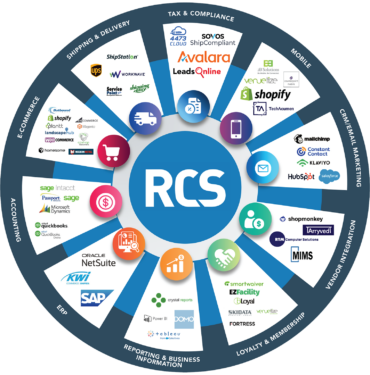The retail industry is fast-paced and competitive, where efficiency, customer satisfaction, and accurate data management are crucial for success. Retailers increasingly rely on technology solutions like point of sale (POS) systems and their integration with application programming interfaces (APIs) to stay ahead. But what exactly is an API, and how can it improve your retail operations? Let’s dive into the key benefits of using APIs with your POS system.
What is an API?
An Application Programming Interface (API) is a set of rules and protocols that allow different software applications to communicate with each other. It’s like a bridge that connects two systems and lets them exchange data seamlessly without requiring human intervention or manual inputs. APIs are often used to integrate software solutions, enabling them to work together to share information and perform tasks more efficiently.
 For instance, when a customer swipes their card at the checkout, the payment gateway communicates with the bank through an API to verify and process the payment. Similarly, when you log into a website using your Google or Facebook credentials, an API is at work, validating your information between the platforms.
For instance, when a customer swipes their card at the checkout, the payment gateway communicates with the bank through an API to verify and process the payment. Similarly, when you log into a website using your Google or Facebook credentials, an API is at work, validating your information between the platforms.
According to a 2020 study by Cloud Elements, 83% of IT professionals believe APIs are critical to the future success of their organizations. They enable businesses to automate tasks, reduce errors, and improve user experiences by connecting various systems.
The Role of APIs in Retail
In the retail world, APIs are increasingly used to connect POS systems with other key technologies such as inventory management, e-commerce platforms, customer loyalty programs, and more. POS systems, like NCR Counterpoint, are the backbone of in-store operations, processing sales, managing inventory, and keeping customer data. However, a POS system on its own may not be enough to keep up with the evolving demands of a modern retailer. This is where APIs come into play.
Key Benefits of Using APIs in Retail
- Real-Time Data Synchronization
One of APIs’ most significant advantages is their ability to facilitate real-time data updates. For instance, when a customer purchases online or in-store, your POS system instantly updates the inventory levels. This ensures you never sell a product that’s out of stock and reduces the risk of stock discrepancies. Real-time synchronization improves operational efficiency and enhances the customer experience by providing accurate product availability data. According to Salesforce, 79% of consumers expect consistent interactions across various retail channels. An API integrated with your POS system can make that expectation a reality. - Enhanced Customer Loyalty Programs
APIs allow you to integrate your POS system with customer loyalty programs and CRM systems. This way, every purchase a customer makes automatically updates their loyalty status, offering rewards, discounts, or promotions in real time. These integrations can lead to personalized marketing efforts, better customer retention, and a more engaged customer base. A report from Queue-It found that 85% of consumers say loyalty programs make them more likely to continue to shop with brands. - Streamlined E-commerce Integration
Today’s retailers must operate across multiple channels, including physical stores, e-commerce platforms, and mobile applications. An API allows you to link your POS system with your online store, providing real-time inventory availability and streamlining the order management process. NCR Counterpoint, for example, can integrate with e-commerce platforms like Shopify or WooCommerce through APIs, allowing seamless data flow between the online and offline worlds. This integration ensures that inventory levels remain accurate and current, whether a sale is made online or in-store. - Improved Reporting and Analytics
APIs enable retailers to pull data from various systems into a central hub for comprehensive reporting and analysis. For instance, you can integrate your POS system with business intelligence (BI) tools or custom dashboards to get detailed reports on sales, customer behavior, and inventory trends. With such reports, retailers can make data-driven decisions to optimize their operations. - Custom Solutions and Flexibility
Not all retail operations are the same, and many retailers have unique requirements. The RCS API offers flexibility by allowing businesses to build custom integrations that suit their specific needs. Whether you want to integrate a proprietary system with NCR Counterpoint or use custom reporting tools, APIs provide a way to tailor your software environment. Retail Control Systems (RCS) offers integrations tailored to specific retail operations. These help businesses automate processes, reduce manual labor, and optimize workflows for better efficiency. - Reduction in Errors
Manual data entry is prone to mistakes. With API integration, much of the data entry work is automated. This reduces human errors and ensures that all systems work with the same accurate, up-to-date information. - Greater Flexibility and Scalability
APIs allow retailers to scale their operations without overhauling their entire technology stack. As your business grows, APIs let you add new systems or expand existing ones to meet demand. Whether adding new e-commerce platforms, integrating with new suppliers, or expanding your brick-and-mortar locations, APIs make it easy to adapt.
NCR Counterpoint and Retail Control Systems
 With the RCS API and Counterpoint, you can integrate various applications that help streamline operations, including e-commerce platforms, customer loyalty programs, shipping applications, accounting packages, ERP solutions, BI tools, and so much more. Whether you want to enhance operations, introduce new services, or simplify your bookkeeping, our API is designed to support you at every stage.
With the RCS API and Counterpoint, you can integrate various applications that help streamline operations, including e-commerce platforms, customer loyalty programs, shipping applications, accounting packages, ERP solutions, BI tools, and so much more. Whether you want to enhance operations, introduce new services, or simplify your bookkeeping, our API is designed to support you at every stage.
The RCS API seamlessly integrates NCR Counterpoint with platforms like Salesforce, Shopify, QuickBooks, NetSuite, Power BI, Domo, and more. These integrations enhance your ability to track sales, manage inventory, process payments, and engage with customers across multiple touchpoints.
APIs are the Future of Retail
In today’s competitive retail environment, leveraging technology is essential for staying ahead. By integrating your POS system with other key business tools through APIs, you can streamline operations, enhance customer experiences, and make data-driven decisions. The powerful RCS API helps retailers optimize every aspect of their business, from resource planning to customer loyalty programs.
With the flexibility to integrate custom solutions, APIs transform how retailers do business. Now is the time to start looking into integrating your system if you’re not already using APIs to power your retail operations. Contact a retail expert today!
